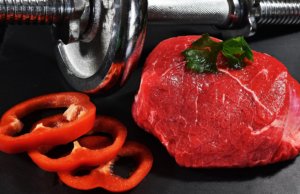Weight Management
Weight management and healthy weight loss is a struggle for many individuals. There are multiple factors which affect weight management, such as environmental and genetic factors. A combination of our culture, where most individuals live sedentary lifestyles, mixed with unhealthy high calorie diets is a huge obstacle for many battling healthy weight loss.
Checking Out Your Body Composition
Body composition takes into account the relationship between fat, muscle, bone and water in the body. One of the most common ways of calculating body composition is BMI (body mass index) . Personally, this is not my favourite way of calculating body composition as it is not always the most accurate due because it does not fully recognize the ratio of body fat to muscle mass. For instance, an individual who is very muscular may end up with an overweight BMI reading. So how do you calculate your BMI? Let’s take a look.

BMI is found from dividing weight in pounds by height in inches squared and multiplied by a conversion factor of 703
((weight in pounds) / (height in inches)^2) x 703
Match your score to the BMI chart and it will tell you if you fall within underweight, normal, overweight and obese category.
Refer here to easily calculate your BMI.
Causes of Obesity
Body shape and your body composition is effected by genetic and environmental factors. Furthermore, although your genes do not change, the environmental factors do, such as a high calorie diet and minimal exercise. Any factors from unhealthy lifestyle choices, low levels of activity, and poor food choices will contribute to obesity.

Genetics
Finding the exact impact genetic factors have on your body composition is very hard. Additionally, genetics can affect 50 – 90 percent of your weight (Bushman, 2017). That being said, anywhere from 10-50 percent is environmental. Remember: genetics helps to determine body types such as tall, short, lanky and bulky. So with this in mind it is important to note someone who is very tall and lanky may never be able to attain the body composition of a body builder because of that genetic influence. They will still be able to gain weight and put on muscle, but goals have to looked at accordingly for that individual.
Environment
Genetic factors may contribute to what you can achieve but positive environmental factors can help you reach your genetic potential. This is is why is it very important to make the right choices when it comes to exercise, sleep, and diet. It is hard to break old diet habits, which is why I usually stress healthy habits should start from childhood. But don’t worry: it is never impossible to start making healthy choices.
Calorie Expenditure
The amount of calories burned daily is called total energy expenditure (TEE). As you can see below, there are three major parts:
- Calories expended at rest
- Calories expended during exercise
- Calories expended during digestions and absorption
This biggest portion of calorie expenditure is calories expended at rest also known as basal metabolic rate (BMR).

Calorie Needs
Understanding your calorie needs is a vital component of weight management. There are more complicated methods of determining the calorie needs for each individual but for starters you can refer to this chart. If you are looking to lose weight then you would need less calories and if you are looking to gain weight you will need more calories. Additionally, you also have to consider your calorie expenditure.
Here is another great tool https://www.choosemyplate.gov/games. Choose super tracker and it will help you to find your calorie needs based on goals.
Approaching Healthy Weight Management
Many people are able to lose weight here and there, but to be successful you need to be able to sustain weight loss over the long run. This is why we stress programs that are sustainable vs lose weight quick approaches.
Try this practical approach set your initial weight loss goal. For instance, I want to lose 8-10 percent of my body weight. Once you hit that goal maintain your new weight for 3-4 months before attempting to lose more weight. Weight management can help your body adjust to the new weight. This will make your weight loss plan much more sustainable over the long run.
Nutrition

I’m sure you have heard the expression “abs are made in kitchen”. This little saying dips into the importance of proper nutrition. You can put in all the work you want but if your nutrition is not on point it will greatly hinder your results.
Check out Eating Healthy Macronutrient Overview .
Macronutrients
Carbohydrates, protein and fat make up the macronutrients.
Carbohydrates primarily fuel your body with energy. In it’s simplest form it is called glucose (sugar). This is the main source for your brain and central nervous system. Additionally, glucose drives skeletal muscle contractions. Glucose converts into fat and is stored in adipose tissue. So too much will not help your weight management goals.
Insulin has a big role in fat storage. Insulin is a hormone which is released by the pancreas. Next, the more carbs you eat the more insulin is secreted into the blood. Furthermore, insulin helps to store carbs in blood cells. If you eat a diet high in carbs that does not go over your energy needs you should not gain wait. On the other hand, a diet high in carbs that goes over your energy needs will lead to very high levels of insulin facilitated fat storage.
Protein is usually only used as a fuel source if blood glucose levels drop very low. Adults should eat protein 10 to 35 percent of their total energy intake. Additionally, protein helps keep you feeling full longer. So it is recommended to eat it with each meal to help limit overeating.
Fat is another main source of energy. It is recommended adults eat 20 to 35 percent of total energy intake from fat. Dietary fat is the highest energy dense macro-nutrient and easily turns into body fat. So low fat diets make sense when you are trying to lose weight. Fat is absolutely essential but is very easy to over-consume fat in our day and age.

Quick Tips
- Avoid fad diets and yoyo dieting as they are usually not sustainable over the lang haul.
- Set realistic goals
- Pay attention to portions
- Focus on physical activity
Learn how to maintain weight throughout the holiday season.
Reference
Barbara, Bushman. PHD, Complete Guide to Fitness & Health. 2nd ed. American College of Sports Medicine, 2017.




